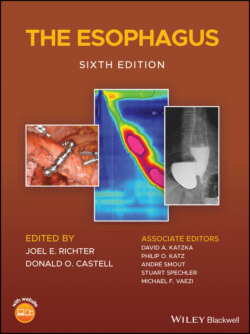Читать книгу The Esophagus - Группа авторов - Страница 27
Globus
ОглавлениеGlobus is a functional esophageal disorder that is best characterized by the sensation of a lump or tightness in the throat, which is nonpainful, is mostly episodic, often improves with eating and swallowing, and is not associated with dysphagia [34]. The sensation has been reported in up to 46% of healthy individuals [35]. The diagnostic criteria for globus are detailed in Table 1.5 [28]. The diagnosis is made through a compatible clinical history and also by ensuring the absence of a structural lesion, GERD, or major motor disorder. The presence of any alarm symptoms such as weight loss or dysphagia warrants further investigation. While globus is more common in patients with reflux symptoms, a strong relationship between GERD and globus has not been established, and for many patients, globus does not respond well to antireflux therapy [28, 34, 36]. The presence of a gastric inlet patch has been associated with globus, and some studies have shown that endoscopic ablation may improve symptoms [37, 38], but the relationship between an inlet patch and globus is inconsistent. When no obvious etiology is found, the pathophysiology of globus is thought to likely be related to visceral hypersensitivity, as is seen in other functional disorders [28].
Table 1.5 Diagnostic criteria for globus.
| Must include all of the following for the past three months, with symptom onset at least six months before diagnosis, with a frequency of at least once per week:Presence of persistent or intermittent, nonpainful sensation of a lump in the throat, with no structural lesion identifiedOccurrence of the sensation between mealsAbsence of dysphagiaAbsence of a gastric inlet patch in the proximal esophagusAbsence of GERD or EoEAbsence of a major esophageal motor disorder |
The management of globus is not well defined, but patients should be reassured that it is a benign condition. Most patients undergo a limited trial of acid‐suppressive therapy, along with an upper endoscopy to evaluate for a structural lesion, gastric inlet patch, or other mucosal processes. Historically, psychological factors such as anxiety and depression have been evaluated in globus patients, and up to 96% of globus patients have reported worsening symptoms during periods of increased stress and emotion [39]. Antidepressants, neuropathic agents such as gabapentin, and behavioral therapy have all been tried, with some anecdotal evidence for their utility [40–43].
